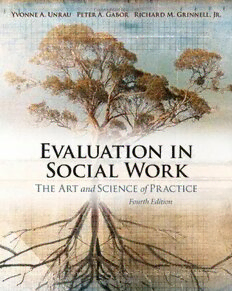
Evaluation in Social Work: The Art and Science of Practice PDF
497 Pages·2006·7.026 MB·English
Most books are stored in the elastic cloud where traffic is expensive. For this reason, we have a limit on daily download.
Preview Evaluation in Social Work: The Art and Science of Practice
Description:
Social work practice is built upon the linkage between the objectives and goals of clients, programs, and agencies, and the evaluation process is critical for making sure those links are strong. Building on its earlier editions with seven new chapters and complete revisions of the others, as well as a strong online companion website presence, this text is more relevant and user-friendly than ever. It provides a straightforward introduction to program evaluation couched within the quantitative and qualitative traditions--the approaches most commonly used to gain social work knowledge. The result gives students a sound conceptual understanding of how evaluation can be used in the delivery of day-to-day services they will be offering your clients, as well as the knowledge and skills necessary to demonstrate accountability.The book builds upon the knowledge and skills of foundational social work research methods courses and assumes mastery of that material. However, the authors have created a uniquely accessible scheme that runs throughout the book in the form of a tree whose components--trunk, twigs, leaves--guide students through the book. They focus on a series of goals, from the basic preparedness for participation in evaluation activities and more advanced courses, to the ability to actively produce and consume evaluative literature. With its clear, direct language, focus on real-life situations, and many visual elements, this new edition is poised to be the text of choice for students and instructors looking for the best way to learn and teach evaluation skills.
See more
The list of books you might like
Most books are stored in the elastic cloud where traffic is expensive. For this reason, we have a limit on daily download.
